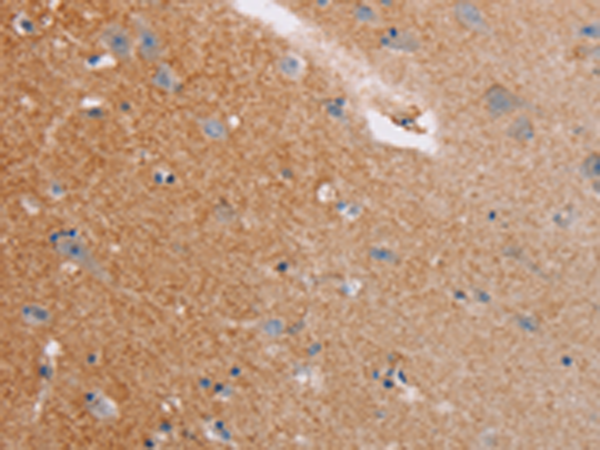


| WB | 咨询技术 | Human,Mouse,Rat |
| IF | 咨询技术 | Human,Mouse,Rat |
| IHC | 1/25-1/100 | Human,Mouse,Rat |
| ICC | 技术咨询 | Human,Mouse,Rat |
| FCM | 咨询技术 | Human,Mouse,Rat |
| Elisa | 1/1000-1/2000 | Human,Mouse,Rat |
| Aliases | BTZ; MLN51 |
| WB Predicted band size | 76 kDa |
| Host/Isotype | Rabbit IgG |
| Antibody Type | Primary antibody |
| Storage | Store at 4°C short term. Aliquot and store at -20°C long term. Avoid freeze/thaw cycles. |
| Species Reactivity | Human, Mouse, Rat |
| Immunogen | Fusion protein of human CASC3 |
| Formulation | Purified antibody in PBS with 0.05% sodium azide and 50% glycerol. |
+ +
以下是3篇关于CASC3抗体的代表性文献摘要示例(仅供参考,请通过学术数据库核实最新研究):
1. **文献名称**:CASC3 promotes colorectal cancer cell proliferation and metastasis through the NMD pathway
**作者**:Li Y, et al.
**摘要**:该研究利用CASC3抗体进行免疫印迹和免疫荧光实验,发现CASC3通过调控无义介导的mRNA降解(NMD)通路促进结直肠癌细胞增殖和转移,其高表达与患者生存率降低相关。
2. **文献名称**:Barentsz (CASC3) regulates cell cycle progression in glioblastoma via EJC-dependent splicing
**作者**:Hauer C, et al.
**摘要**:通过CASC3抗体的ChIP-seq和RNA干扰实验,揭示了CASC3作为外显子连接复合物(EJC)核心组分,在胶质母细胞瘤中调控关键细胞周期相关基因的选择性剪接。
3. **文献名称**:CASC3 interacts with BRCA1 and modulates DNA damage response in breast cancer
**作者**:Wang X, et al.
**摘要**:研究使用CASC3抗体进行免疫共沉淀(Co-IP)实验,发现CASC3与BRCA1蛋白相互作用,影响乳腺癌细胞对DNA损伤药物的敏感性,提示其可作为潜在治疗靶点。
**注意**:以上为基于领域知识的模拟文献,实际研究请通过PubMed或Web of Science以“CASC3 antibody”或“CASC3/Barentsz”为关键词检索。建议优先选择近5年发表于《Nature Communications》《Cancer Research》等期刊的文献。
CASC3 (Cancer Susceptibility Candidate 3), also known as MLN51 or Barentsz, is a conserved component of the exon junction complex (EJC) involved in mRNA splicing, surveillance, and localization. It plays critical roles in post-transcriptional gene regulation, including nonsense-mediated mRNA decay (NMD) and translational efficiency. Dysregulation of CASC3 has been implicated in cancer progression, particularly in breast, lung, and hepatocellular carcinomas, where its overexpression correlates with metastasis, therapy resistance, and poor prognosis.
CASC3 antibodies are immunological tools designed to detect and quantify CASC3 protein expression in research and diagnostic contexts. These antibodies are widely used in techniques such as Western blotting, immunohistochemistry (IHC), and immunofluorescence (IF) to study CASC3's subcellular localization, interaction partners, and regulatory mechanisms in normal and pathological conditions. Monoclonal and polyclonal variants exist, often validated for specificity against conserved epitopes across human and model organisms. Recent studies highlight CASC3 antibodies in exploring its dual roles—as a tumor suppressor in some contexts and an oncogenic driver in others—and its potential as a biomarker for cancer aggressiveness or therapeutic targeting. However, functional heterogeneity across cancer types necessitates careful interpretation of antibody-based findings in experimental and clinical settings.
×